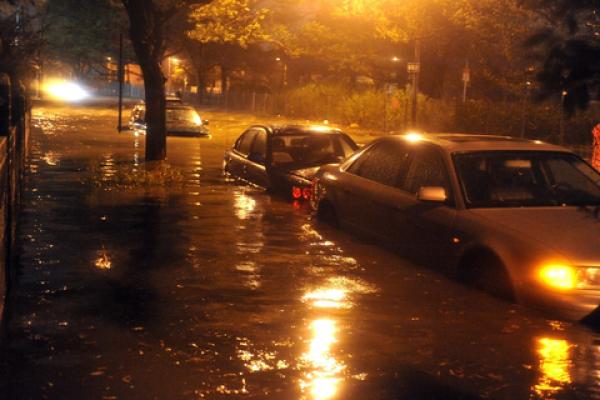IF IT WASN'T the year from hell for the North American continent, it was the year from a place with a very similar temperature.
It's hard to remember, but it began with that bizarre summer-in-March heat wave that meteorologists described as one of the most anomalous weather events in the country's history. Before long there were record blazes burning in Colorado and New Mexico, and then a stifling heat wave moved east, triggering a "derecho" storm that raced almost 1,000 miles from Indiana to the Atlantic and left 5 million without power. July was the hottest month ever recorded in the United States; it was also when drought descended full force on the Midwest, stunting corn and soybeans and driving the world price of grain up by 40 percent (and making sure our hellish year became traumatic for poor people the planet round). By August it was clear we were in for a record melt year in the Arctic; when the long polar night finally fell, it was clear we'd essentially broken one of the planet's biggest physical features. And all that was before Sandy piled into our greatest urban area, leaving behind an indelible image of the future.
So the question becomes, what's an appropriate response? What even begins to match the magnitude of the trouble we face? What doesn't seem like spitting in the wind?
My sense is that the time has come to take on the fossil fuel industry itself—not the members of Congress they buy in droves each election season, but the real powers. Ignoring the damage they've already caused, these people spend hundreds of millions of dollars each day looking for new fossil fuels. And they spend hundreds of millions each year making sure no government stops them. They're like the tobacco industry at this point, except that instead of going after your lungs they're going after the lungs of the planet.
Taking them on is no easy matter—they're the richest industry on earth. But we're trying. The night after the election, we launched a roadshow around the country (see math.350.org for an update). It's now wrapping up, but the important phase is beginning: a wave of divestment movements on campuses and in churches across the country. Since what they care about is money, we need to threaten a little of theirs, just as a generation ago activists were able to help take down the apartheid regime. Desmond Tutu sent us a powerful video to help launch the campaign; the time for divestment has come again, he said, since climate change is the moral issue of our time.
We're gathering people, too, for possible peaceful protest at shareholder meetings and the like. We clearly don't have the money to match the oil guys, but we do have other currencies: passion, spirit, creativity. And sometimes we have to spend our bodies.
We're all implicated in climate change, of course, because we use fossil fuel. But most of us would just as soon use sun or wind to power our lives. It's only the Exxons of the world that are full-on committed to burning carbon, damn the cost. So real change requires changing them, altering the rules under which they work so they decide to become energy companies, not fossil fuel companies. It will be hard, and I don't know if it will work—but I do know we have to respond with a sacrificial spirit to the year we've just seen. The fossil fuel industry is exercising a brutal dominion over the planet—the ugliest kind, not the wise and careful stewardship to which we are called. That's not okay.

Got something to say about what you're reading? We value your feedback!
